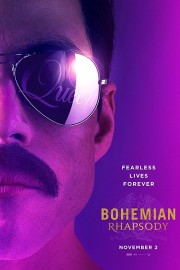Bohemian Rhapsody
There’s a bit of casting in “Bohemian Rhapsody” which sets the tone of the film’s shortcomings as a satisfying biopic on Queen and its iconic lead singer, Freddie Mercury. In the film, Mike Myers plays a producer for the same label that reps Elton John, who is hoping to keep the momentum of their first album going. But Queen has other ideas, and the resulting album, “A Night at the Opera,” was a bold show of the band’s lack of desire to continue churning out what worked before. The centerpiece of that album is the song that shares a title with this film, and you can imagine what is going to happen in the film with just that information. Myers is playing a producer who said “no” to “Bohemian Rhapsody,” 26 years after his Wayne and Dana Carvey’s Garth brought the song back to prominence in “Wayne’s World.” How did anyone expect this to work in a serious biopic of the band?
Alas, while it’s anchored by a tremendous performance by Rami Malek as Mercury, and has cast Brian May, Roger Taylor (both of whom had creative control over the film) and John Deacons to pitch-perfect look accuracy, “Bohemian Rhapsody” is a terrible excuse for a biopic of one of the great rock bands, and maybe the greatest lead singer, in rock n’ roll history. While the box-office receipts will no doubt satisfy May and Taylor, I cannot imagine they would be happy with the end result as artists, unless they just wanted a standard biopic, that seems to paint Mercury in a fairly negative light, because this film lacks imagination and inventiveness while showing us the history of a band that oozed plenty of both from the time they formed in the ’70s until Freddie Mercury’s death from AIDS-related pneumonia in 1991. Part of that could be do to a disjointed production that saw Bryan Singer fired after a series of flare-ups with Malek, and his departure from set around Thanksgiving of last year, and replaced with Fletcher to finish the film. (Because of Director’s Guild rules, Singer still receives full credit as director, having directed most of the footage used, in the end film.) But while many reviewers have brought up “Walk Hard: The Dewey Cox Story” as a comedic point of reference to how far off the mark “Bohemian Rhapsody” lands, I have not seen that, but I have seen “This is Spinal Tap,” and by ending the film with their reunion performance at 1985’s Live Aid benefit concert after the band broke up, the comparison is more than apt, and an embarrassment.
I love Queen’s music, and yes, “Wayne’s World’s” use of “Bohemian Rhapsody” was part of that as I started to feel out my personal musical taste. When the film finds itself on stage or in the recording studio, whether it’s the creation of classics like “Rhapsody” or “We Will Rock You” or the band playing them in concert, a bit of a pulse begins to be felt during the film, but it’s because of the energy Malek brings to his physical performance when on stage, and the uncanny work he and the other actors do when they get into character in studio. It also has to do with how ambitious Queen as a band was musically. Just listening to the greatest hits compilations that came out in 1992, you hear how many different musical styles found their way into Queen’s music, and how interested they were in not repeating themselves from project to project, song to song. There are a great many iconic songs played throughout “Bohemian Rhapsody,” and if there’s someone who discovers Queen and the music because of the film, I guess there’s some value to that. But the band, and Mercury, had more going on in their music, and lives, that is hinted at in the film, and script by Anthony McCarten from a story he wrote with Peter Morgan. Mercury’s personal life is a focus here- his rift with his conservative Pakastani father and family, his love of Mary Austin (Lucy Boynton), his realization of his homosexuality, and his decadent lifestyle (egged on by the lecherous Paul Prenter, played by Allen Leech)- but it boils down his struggle to pop psychology without really digging further. That might be due to the fact that May and Taylor wanted the film to focus as much on the band as it does Mercury, which is why Sascha Baron Cohen ended up bailing on the film, and while that is their prerogative as surviving members of the band, you almost wish they had given up a bit of control so that we might have gotten a bit deeper into Mercury as an individual. But maybe they have always felt like they were in his shadow, and they wanted a bit of time in the spotlight, as well. As great as they are as musicians, though, a biopic about the band always had to have Freddie at the center; sadly, the one we got is like that producer Mike Myers plays- it focuses so much on what it thinks people want without realizing that over time, more depth and complexity is how you create something that lasts. Queen did just that with its music; “Bohemian Rhapsody” didn’t follow through.










